The Future of Global Trade: Implications for Indonesia’s Economy

As the global trade landscape evolves rapidly, Indonesia faces both challenges and opportunities. The rise of digitalization and shifts in trade policies are reshaping international markets, with significant implications for Indonesia’s economy.
The advent of digital technologies, such as blockchain and e-commerce, is streamlining global trade processes and enhancing transparency. For Indonesia, this means greater access to international markets and improved efficiency in trade transactions. The country’s burgeoning digital infrastructure and tech-savvy workforce position it well to leverage these advancements.
However, Indonesia must navigate several hurdles. The ongoing trade tensions between major economies, such as the U.S. and China, create an uncertain environment for Indonesian exporters. Additionally, global supply chain disruptions have highlighted vulnerabilities in the country’s manufacturing sector. Strengthening supply chain resilience and diversifying export markets are crucial for mitigating these risks.
Furthermore, Indonesia’s participation in regional trade agreements, like the Regional Comprehensive Economic Partnership (RCEP), offers new opportunities. These agreements provide access to larger markets and reduced trade barriers, which can boost Indonesia’s exports and attract foreign investment.
To harness these opportunities, Indonesia needs to focus on improving trade infrastructure, enhancing workforce skills, and fostering innovation. By doing so, the country can better position itself in the global trade arena and drive sustainable economic growth.
In summary, while global trade transformations present challenges for Indonesia, they also offer significant opportunities. Embracing digital advancements and strategic trade partnerships will be key to securing Indonesia’s economic future.